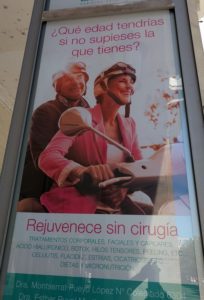My friend Sue and I didn’t visit any language-related destinations today, making it an exception in our linguistic tour of northern Spain. I’d like to take advantage of this “day off” to share with you some uses of the -se imperfect subjunctive that I unexpectedly observed yesterday.
The -se imperfect subjunctive is one of my favorite phenomena in Spanish: not only does the language have both present and past tense subjunctives, but also, the past tense subjunctive has two different forms. This is an unusual and possibly unique type of grammatical redundancy.
Of the two past subjunctives, the version that ends in -ra is much more common than the one that ends in -se. One sees the -se subjunctive in literature, but I’d never heard anyone use it in conversation, or seen it in any casually written text. (It does shows up in literature.) I was thrilled, then, to run into the -se subjunctive twice yesterday. First, our tour guide at the Monasterio de Suso used it once or twice in his explanations. Later, during our lunch stop in Zaragoza, I spotted it on a poster for an anti-aging treatment. This text on the poster asks ¿Qué edad tendrías si no supieses la que tienes? ‘How old would you be if you didn’t know how old you were?’; I’ve underlined the subjunctive. The newer, and more frequently used, form would be supieras. Seeing the subjunctive in action, after spending so much time researching and writing about it, was a real thrill. Plus, I love the poster — and I’m glad to say that Dra. Montserrat Salvador López, whose services it advertises, is listed as one of Spain’s Top Doctors!
Seeing the subjunctive in action, after spending so much time researching and writing about it, was a real thrill. Plus, I love the poster — and I’m glad to say that Dra. Montserrat Salvador López, whose services it advertises, is listed as one of Spain’s Top Doctors!